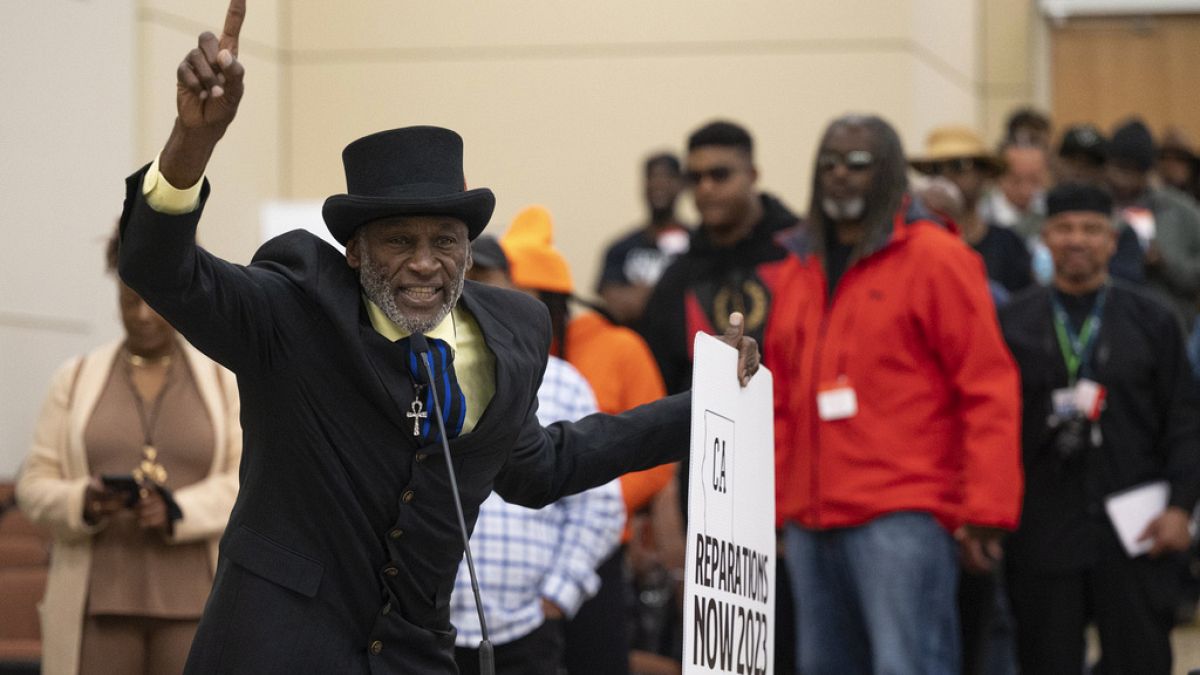The 1100-page document includes more than 100 recommendations on how to address the harms of slavery.
The final report of California’s first-in-the-nation reparations task force has been handed to state lawmakers, beginning the next chapter in the long struggle to compensate the descendants of slavery.
The historic 1100-page report details California's role in perpetuating discrimination against Black residents.
The report suggests more than 100 ideas for repairing the harm, ranging from formally apologising to paying descendants of enslaved people for having suffered under racist actions such as over-policing and housing discrimination. The panel also recommended creating a new agency to oversee reparations efforts.
“This book of truth will be a legacy, will be a testament to the full story,” said Lisa Holder, a civil rights attorney and task force member. “
Anyone who says that we are colour-blind, that we have solved the problem of anti-Black animus and racism, I challenge you to read this document.”
A national model
Federal reparations efforts have stalled for decades, and the report could serve as a national model for how governments can attempt to right the wrongs of the past.
An advisory group in San Francisco recommended that qualifying Black adults receive a $5 million (€4.6 million) lump sum, a guaranteed annual income of at least $97,000 (€89,000) and personal debt forgiveness.
San Francisco supervisors are supposed to take up the proposals later this year.
New York may soon follow California by creating a commission to examine the state's involvement in slavery and consider addressing present-day economic and educational disparities experienced by Black people.
The California panel did not recommend a fixed dollar amount for financial redress but endorsed economic methodologies to calculate what is owed for decades of over-policing, disproportionate incarceration and housing discrimination.
Economists recommended nearly $1 million (€920 thousand) for a 71-year-old Black person who lived all their life in California - or $13,600 (€12,000) per year - for health disparities that shorten the average life span.
Fervour for reparations
The nine-member reparations panel was formed in the wake of George Floyd’s killing in 2020 by police in Minnesota and the group met for the first time in June 2021.
Members include lawyers, educators, elected officials and civil rights leaders descended from enslaved people.
One of the key policies the document seeks to confront is policies and practices that have led to Black Californians being disproportionally stopped by police, killed by law enforcement or imprisoned.
Recommendations include ending the death penalty, banning cash bail, requiring anti-bias training for police officers and funding education for more African American prospective lawyers. The panel also called on lawmakers to bar searches by law enforcement based on a person's consent alone.
Could reparations become a reality in Europe?
Police violence in cases like George Floyd's is not limited to the United States. France is currently experiencing a wave of protests around the country following the police fatal shooting of a 17-year-old Algerian man, identified only by his first name, Nahel, in Paris.
His death on Tuesday was the third of its kind this year, down from a record 13 people who were killed after not complying with a traffic stop in 2022.
There were three such killings in 2021 and two in 2020, none in 2019 and six in both 2018 and 2017, with the majority of victims since 2017 being Black or of Arab origin, according to a Reuters tally.
The deaths have prompted demands for more accountability in France and also Black Lives Matter protests against racial injustice after Floyd’s killing.
In 2020 the EU unveiled its' Anti-Racism Action Plan, which requires EU countries to adopt national action plans taking into account their colonial past in order to better tackle issues of structural racism.
These protests also put in greater focus the legacy of the United Kingdom’s colonial past.
King Charles is facing increasing pressure to apologise for the Royal Family's role in the slave trade, with some calls for financial reparations to be considered. In April, he backed a landmark UK study into the monarchy's involvement in the slave trade.
His Dutch counterpart, King Willem-Alexander made a formal apology on July 1, when the Netherlands marks the 150th anniversary of the end of slavery on what is known as Keti Koti, or Emancipation Day.
Following California's landmark report we can expect calls for reparations in Europe to become increasingly loud.
Germany's example
Several scholars of US slavery and the history of reparations have written articles explaining the ongoing debate.
Professor of political science who studies the relationship between democracy, citizenship and justice, Bernd Reiter has highlighted how Germany dealt with the horrors of the Holocaust.
Instead of seeking to erase the Holocaust from its history, the German government has paid since the end of World War II the equivalent of $7 billion (€6.5 billion) for Israel and $1 billion (€920 million) for the World Jewish Congress, an international federation of Jewish communities and organisations.
“The German government has worked hard to ensure remembrance, penance, recompense and justice,” Reiter wrote. “The United States, in contrast, has no official policy of atoning for slavery.”



